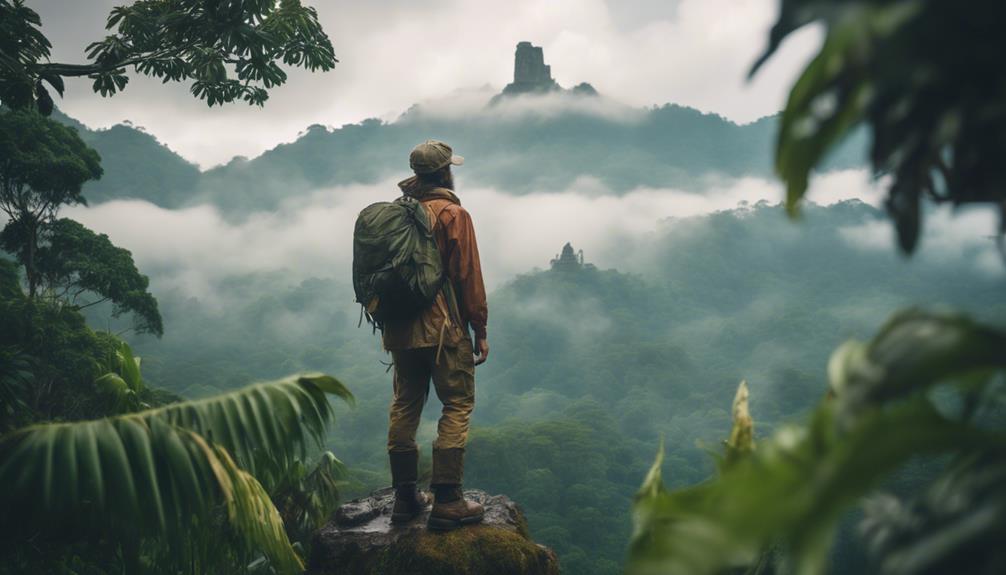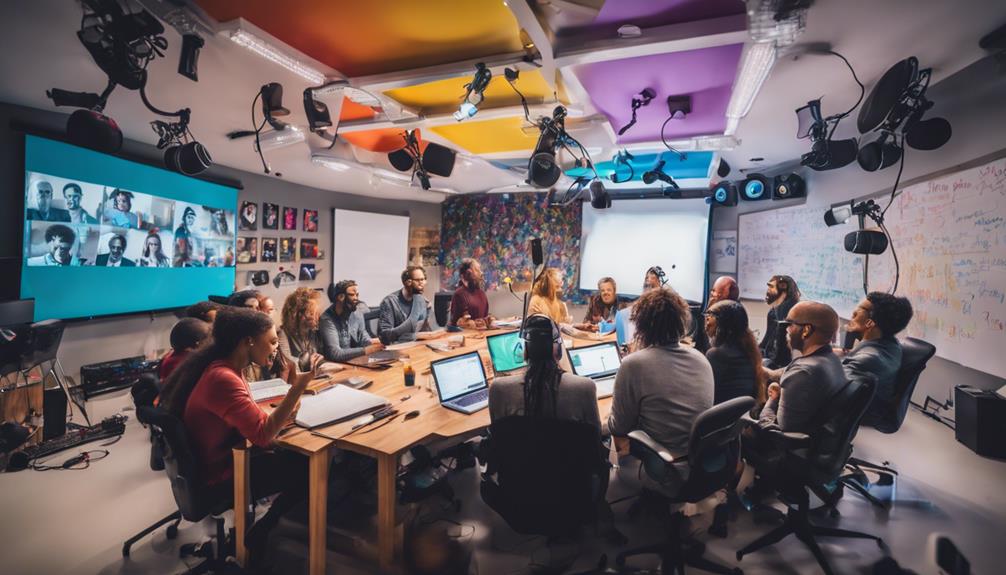Wade Davis is an extraordinary explorer whose work has revealed the breathtaking connections between diverse cultures and ecosystems. You'll appreciate how his childhood adventures in British Columbia nurtured his love for nature. As the former National Geographic Explorer-in-Residence, he engaged with numerous indigenous groups, emphasizing the importance of traditional ecological knowledge. His documentaries and writings highlight the urgent need for environmental and cultural preservation. Through powerful storytelling, he inspires action against biodiversity loss. There's much more to discover about his journey and impact on our understanding of the world's secrets.
Background Information
Wade Davis's childhood in British Columbia sparked his lifelong passion for exploration and understanding diverse cultures.
As a National Geographic Explorer of the Year, he's achieved remarkable feats in his expeditions.
His previous adventures and accomplishments reflect a commitment to both the environment and indigenous rights.
Childhood Adventures in British Columbia
Growing up amidst the breathtaking landscapes of British Columbia, Wade Davis developed a profound connection to nature through countless adventures in the wilderness. As you wander through the lush forests and sparkling rivers, you can almost feel the spirit of exploration that fueled his childhood. His family instilled a love for adventure, encouraging him to hike and canoe in these stunning surroundings. Each journey offered him a glimpse into the rich biodiversity of the region, sparking a lifelong curiosity about the natural world.
Davis's childhood adventures also introduced him to the indigenous cultures of British Columbia. You can imagine the wonder he felt as he learned about their intricate relationships with the environment, which deepened his understanding of culture and ecology. These early experiences shaped his future, guiding him toward a career focused on conservation and cultural advocacy.
In this vibrant landscape, Wade Davis not only forged a bond with nature but also laid the groundwork for a lifetime of exploration and respect for the wisdom of indigenous peoples. This connection continues to inspire his work, revealing the world's secrets through a lens of appreciation and understanding.
National Geographic Explorer of the Year
As National Geographic Explorer-in-Residence from 2000 to 2013, Davis conducted groundbreaking research and documentary work that significantly advanced our understanding of cultural and ecological diversity. His tenure at National Geographic allowed him to immerse himself in the lives of 15 indigenous groups across the Amazon and Andes, fostering a deep appreciation for their unique perspectives and practices.
Davis's explorations didn't just highlight the importance of cultural understanding; they also emphasized the essential role of biodiversity in maintaining ecological balance. His compelling storytelling and advocacy efforts have inspired countless individuals to appreciate and protect the delicate ecosystems that many indigenous communities inhabit.
Recognized as one of the Explorers for the Millennium by National Geographic, Davis has received numerous accolades for his contributions to anthropology and exploration. Remarkably, he was awarded the 2009 Gold Medal from the Royal Canadian Geographical Society and the 2011 Explorers Medal, underscoring the impact of his work.
Through his achievements, Davis continues to educate others on the interconnectedness of culture and nature, promoting a global understanding of the need for environmental conservation.
Previous Expeditions and Achievements
Davis's previous expeditions have taken him deep into the heart of the Amazon and Andes, where he engaged with diverse indigenous cultures and gathered invaluable knowledge about their unique botanical practices.
As an Explorer-in-Residence at the National Geographic Society from 2000 to 2013, Wade Davis conducted extensive fieldwork that enriched our understanding of anthropology and ethnobotany.
Throughout his career, he lived among 15 indigenous groups, immersing himself in their traditions and gaining insights into their relationship with nature. His work has led to the publication of 23 influential books, including 'One River' and 'The Wayfinders,' along with around 375 scientific and popular articles. These contributions have greatly impacted the fields of anthropology and ethnobotany.
Davis's achievements haven't gone unnoticed; he's been named one of the Explorers for the Millennium by National Geographic and has received 12 honorary degrees.
His photographic endeavors, featured in 37 books and 130 magazines, highlight the beauty and diversity of the cultures and ecosystems he studies.
Through his expeditions, you can see how Wade Davis continues to reveal the world's secrets.
Current Updates or Main Focus
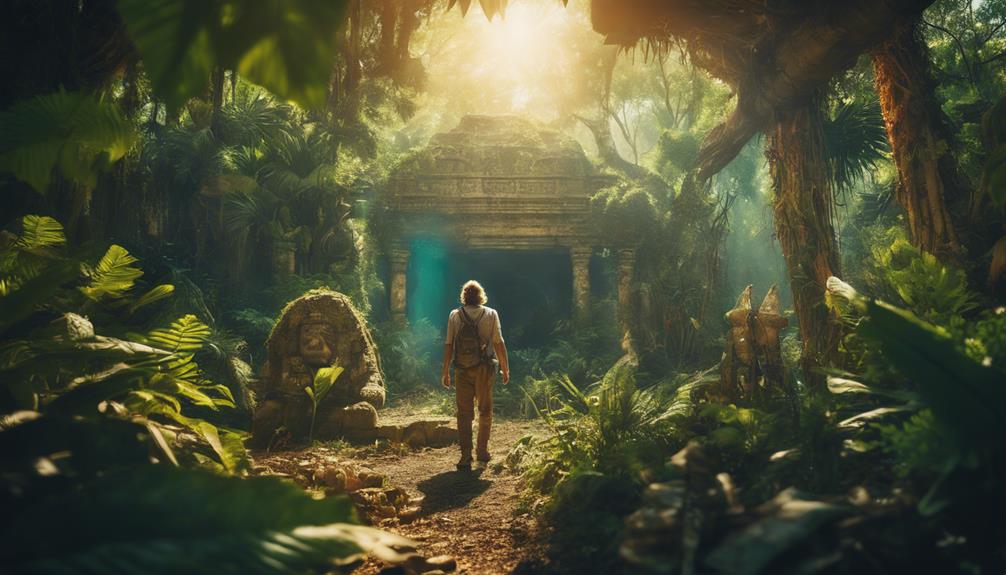
Wade Davis is making waves with his new documentary focused on indigenous cultures, bringing attention to their rich traditions and challenges.
He's also exploring the world of documentary filmmaking to enhance cultural preservation initiatives, particularly in Africa.
As you follow his journey, you'll see how his work continues to highlight the urgent need for protecting diverse cultural landscapes.
New Documentary on Indigenous Cultures
Exploring the intricate relationships between indigenous cultures and their environments, the new documentary 'El Sendero de la Anaconda' highlights the essential role traditional ecological knowledge plays in the Amazon. Wade Davis showcases various indigenous groups, illustrating how they act as stewards of biodiversity and advocates for environmental conservation.
Through stunning cinematography, the film captures the beauty of the Amazon rainforest while revealing the challenges these communities face amid climate change and resource exploitation. By integrating anthropological insights with personal narratives from community members, Davis provides a platform for indigenous perspectives on cultural preservation.
You'll see firsthand how traditional ecological knowledge is vital for maintaining the delicate balance of the ecosystem. The documentary not only emphasizes the need to protect these indigenous cultures but also underscores their invaluable contributions to global biodiversity.
As you watch, you'll understand that the survival of these cultures is intertwined with the health of the environment itself. 'El Sendero de la Anaconda' invites you to appreciate the rich tapestry of indigenous wisdom and its significance in our fight for a sustainable future.
Exploration to Documentary Filmmaking
The shift from exploration to documentary filmmaking has allowed Wade Davis to merge his passion for adventure with the art of storytelling, creating powerful narratives that highlight the richness of indigenous cultures and their environments.
His eight-hour documentary, 'Light at the Edge of the World,' produced for National Geographic, exemplifies this blend, showcasing diverse cultural narratives while emphasizing the importance of indigenous knowledge.
Davis's recent film, 'El Sendero de la Anaconda,' available on Netflix, further extends his influence in the domain of documentary filmmaking.
Through engaging visuals and compelling narratives, he raises awareness about biodiversity and the intricate relationships between people and their ecosystems.
His work doesn't just entertain; it educates, inspiring audiences to appreciate the delicate balance of nature and culture.
Cultural Preservation Initiatives in Africa
Cultural preservation initiatives in Africa are gaining momentum as communities work to safeguard their rich heritage in the face of globalization and modern challenges. You'll find that many organizations, like the African Cultural Heritage Trust, focus on revitalizing traditional practices and documenting indigenous languages. With over 2,000 languages at risk of extinction, these efforts are essential for maintaining cultural identity among younger generations.
UNESCO's Intangible Cultural Heritage program further highlights the significance of African traditions, including music, dance, and storytelling, recognizing their role in fostering community cohesion and cultural diversity. By prioritizing these practices, communities can strengthen their ties and sense of belonging.
Moreover, the African Union's Agenda 2063 encourages member states to incorporate cultural heritage into national policies, promoting unity among diverse populations. Recent successes in countries like Ethiopia and Kenya show that reviving traditional crafts and storytelling not only preserves heritage but also attracts tourism, bolstering local economies.
These initiatives reflect a growing recognition of the importance of cultural preservation, ensuring that Africa's rich traditions and languages continue to thrive for future generations.
Detailed Analysis

Wade Davis's recent expeditions reveal fascinating discoveries that highlight the richness of indigenous cultures.
As a cultural ambassador for indigenous rights, he passionately advocates for the preservation of their knowledge and practices.
Your understanding of how exploration fuels cultural appreciation will deepen as you explore his work and its impact on both ecology and society.
Recent Expeditions and Discoveries
Recent expeditions by Davis have uncovered essential traditional ecological knowledge that indigenous communities use to combat environmental threats. By immersing himself in the lives of 15 indigenous groups across the Amazon and Andes, you can see how their sustainable practices are vital for maintaining biodiversity and protecting cultural heritage. His exploration of the Kogi people in Colombia reveals their unique worldview, which emphasizes ecological balance and the interconnectedness of life.
Davis's work focuses on documenting these sustainable practices and the rich ecological knowledge that indigenous groups possess. His findings raise significant awareness about the threats to biodiversity faced by these communities as modern challenges intensify. Through various speaking engagements and publications, he advocates for the preservation of this knowledge, arguing that it holds the key to addressing contemporary environmental issues.
Additionally, Davis has translated his insights into both literary and visual formats, highlighting the urgent need for global action. His documentaries showcase how indigenous practices can guide our understanding of ecological relationships, inspiring you to appreciate the wisdom embedded in cultural heritage. By recognizing these connections, you can join the conversation about sustainable futures.
Cultural Ambassador for Indigenous Rights
As an advocate for indigenous rights, Davis emphasizes the essential role that traditional knowledge plays in both cultural preservation and environmental sustainability. He believes that understanding the cultural significance of indigenous practices is vital for fostering respect and advocacy. Through his work with various indigenous communities, Davis highlights how these groups contribute to environmental stewardship, often using methods that have sustained their ecosystems for generations.
By advocating for a holistic approach to conservation, he urges leaders to integrate indigenous knowledge into environmental discussions. Davis's presentations and writings make it clear that traditional practices aren't merely relics of the past; they hold valuable insights for contemporary challenges. Engaging with indigenous perspectives, he asserts, can lead to more effective solutions for pressing global issues.
His political advocacy further amplifies indigenous voices, encouraging respectful representation in societal conversations. As an Honorary Member of the Explorers Club and Vice President of the Royal Canadian Geographical Society, Davis inspires both action and awareness surrounding indigenous rights.
In doing so, he connects culture and ecology, promoting a future where traditional knowledge is valued and preserved for generations to come.
Exploration Fuels Cultural Understanding
Exploration fosters cultural understanding by enabling direct engagement with diverse communities, allowing you to witness their ecological practices and rich traditions firsthand.
Wade Davis's fieldwork among 15 indigenous groups in the Amazon and Andes exemplifies this connection. Through his writings, such as 'One River' and 'The Wayfinders,' you see how storytelling and indigenous knowledge deepen your appreciation for cultural diversity.
Davis emphasizes that understanding local customs can lead to sustainable practices, vital for tackling global environmental challenges. The Kogi people's worldview, which highlights a reciprocal relationship with nature, challenges conventional extraction-focused perspectives.
This insight is significant for effective environmental advocacy.
Public Reaction or Expert Opinions
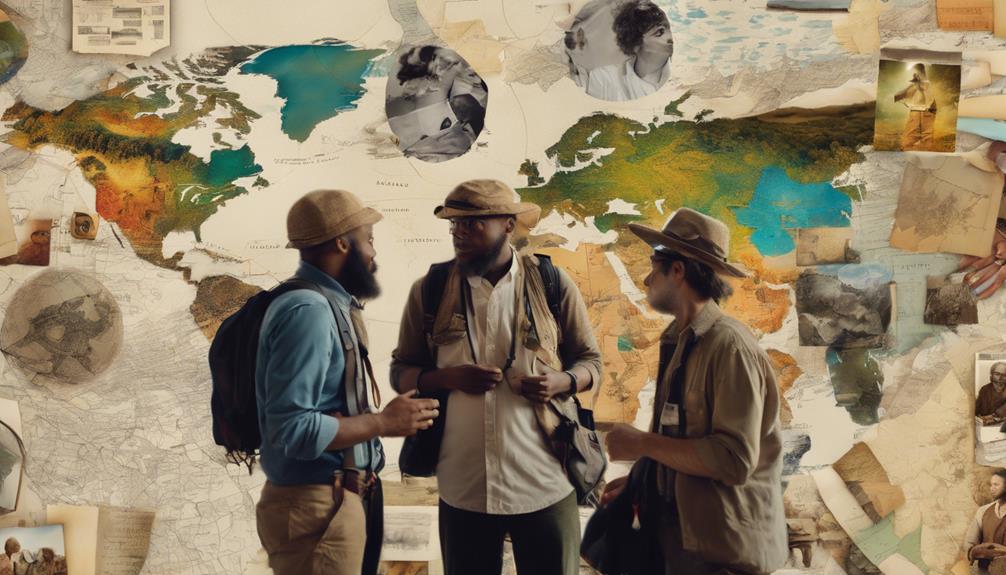
Wade Davis's work has sparked a whirlwind of reactions, from viral tweets that highlight cultural insights to passionate audience praise and critiques.
You'll see how his advocacy for indigenous rights and sustainable practices resonates with many, elevating important discussions in today's society.
Join the conversation as we explore the varying perspectives on Davis's impact and legacy.
Viral Tweets on Cultural Insights
Cultural insights shared by Wade Davis have sparked viral conversations on social media, with many praising the urgent need to preserve indigenous knowledge and practices. Tweets highlight how Davis emphasizes the connection between cultural heritage and biodiversity, shedding light on the crucial role of indigenous communities in maintaining ecological balance.
Followers express concern over the decline of linguistic diversity, echoing Davis's warnings about the potential loss of valuable cultural knowledge as nearly half of the world's 7,000 languages fade away. Users share clips from his TED talks, which resonate deeply, inspiring a wave of discussions about the interconnectedness of cultures and their environments.
Many users note how Davis's storytelling blends scientific insight with compelling narratives, urging people to engage with the diverse human experience. The Kogi people's spiritual worldview serves as a poignant example, illustrating the reciprocal relationship between humanity and nature.
These viral tweets not only amplify Davis's message but also create a community that values the preservation of indigenous practices, fostering a collective responsibility toward safeguarding our planet's cultural and ecological diversity.
Audience Praise and Critiques
Readers have praised 'One River' for its vivid language and emotional depth, often calling it one of the best books they've ever encountered. This compelling narrative not only explores the life of Richard Evans Schultes, a significant figure in ethnobotany, but also investigates the rich cultural and environmental themes surrounding the Amazon. Many appreciate how Davis highlights the intricate relationship between indigenous groups and their botanical knowledge, emphasizing the importance of preserving these cultures in the face of exploitation.
However, some critiques have emerged regarding the book's extensive detail, with a few readers feeling that tighter editing could enhance coherence and flow. While Schultes is portrayed as a heroic explorer, some argue that this depiction lacks balance, overlooking critical aspects of his career.
Despite these critiques, 'One River' continues to resonate with audiences interested in the complexities of exploration, history, and culture. It's a recommended read for those captivated by the interconnectedness of human experience and nature, as well as the urgent need to protect the Amazon and its indigenous communities.
Indigenous Rights Advocacy Insights
Davis's commitment to amplifying indigenous voices in environmental discussions has garnered widespread respect among advocates and scholars alike. Many recognize that his emphasis on indigenous groups brings vital insights into environmental sustainability and cultural preservation. By engaging with communities like the Kogi, you see how their ecological philosophies challenge conventional approaches to nature and heritage.
Experts often highlight the link between indigenous knowledge and effective strategies for combating climate change. They argue that these communities have long understood the intricate balance between human life and the environment, knowledge often overlooked due to the legacies of colonialism. Davis's work reveals the urgent need to protect these traditions, as exploitation threatens not only their lands but also the invaluable wisdom they hold.
Public reaction to his advocacy has been overwhelmingly positive, as many advocate for policy changes that reflect these insights. Collaborations with policymakers indicate a growing recognition of the importance of inclusive decision-making processes. You can sense a shift in perspective, with increasing calls for integrating indigenous rights into broader environmental initiatives, ensuring that the voices of those most affected by climate change are heard and respected.
Broader Implications
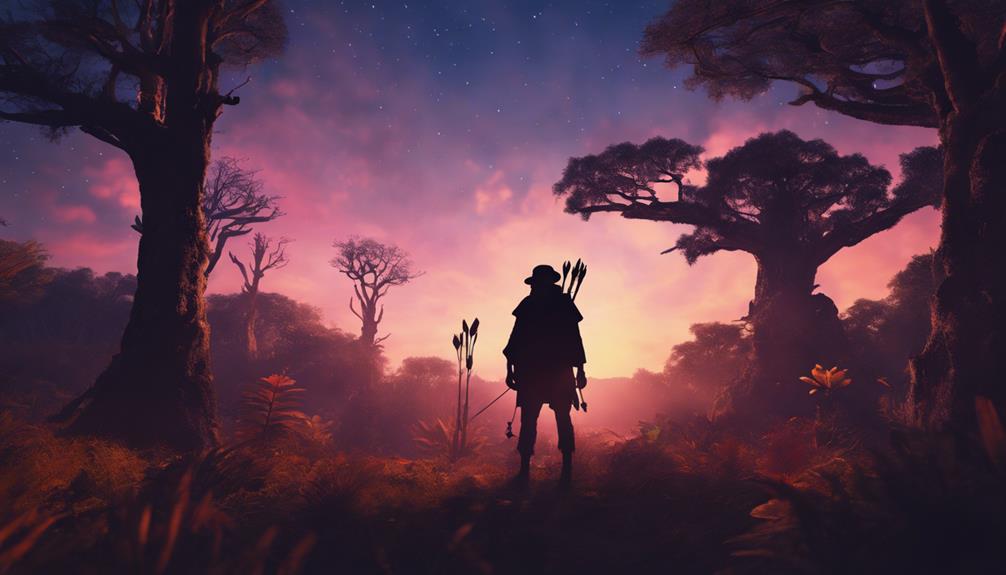
You'll notice that Wade Davis's approach revitalizes documentary storytelling techniques, making them more engaging and relevant.
By incorporating emerging technologies in filmmaking, he transforms how cultural narratives are shared and experienced.
This cultural storytelling revolution not only captivates audiences but also fosters a deeper appreciation for diverse perspectives and ecological wisdom.
Revitalizing Documentary Storytelling Techniques
Revitalizing documentary storytelling techniques transforms how audiences connect with complex cultural and ecological narratives, making them more engaging and impactful. Wade Davis masterfully combines rich visual imagery with narrative depth, allowing you to immerse yourself in the stories of diverse cultures and their environments. His work, especially in the eight-hour documentary 'Light at the Edge of the World,' exemplifies the integration of adventure with scientific inquiry, showcasing the interconnectedness of cultural diversity and ecological knowledge.
By emphasizing personal experiences and ethnographic storytelling, Davis makes documentary filmmaking accessible and relatable. You find yourself appreciating the importance of preserving indigenous knowledge and biodiversity. His documentaries serve as powerful platforms for raising awareness about urgent global issues, such as climate change and cultural erosion. They foster a sense of responsibility among viewers like you to engage in conservation efforts.
In this way, Davis not only entertains but also educates, encouraging you to advocate for cultural diversity and ecological sustainability. This revitalization of documentary storytelling transforms passive viewing into an active call to action, inspiring you to become a part of the solution for our planet's most pressing challenges.
Emerging Technologies in Filmmaking
Emerging technologies in filmmaking are reshaping how you experience stories, offering immersive and interactive opportunities that deepen your emotional connection to the narrative.
Virtual reality (VR) and augmented reality (AR) create immersive storytelling experiences that allow you to engage with stories in ways that traditional formats can't match. As visual effects continue to evolve, filmmakers can craft stunning visuals that enhance the cinematic experience, making you feel as if you're part of the action.
Artificial intelligence (AI) is also making waves in film production. It streamlines processes like script analysis and editing, helping filmmakers work more efficiently and focus on their creative vision. This technological shift benefits independent filmmakers too, as crowdfunding platforms and blockchain technology democratize funding, enabling diverse voices to flourish in cinema.
Moreover, streaming services leverage big data analytics to understand viewer preferences. This insight allows filmmakers to tailor their projects to audience demands, optimizing distribution strategies and ensuring that your viewing experience aligns with your interests.
Cultural Storytelling Revolutionized
Cultural storytelling is transforming how we comprehend and connect with diverse communities, revealing the rich tapestry of human experience through shared narratives. Wade Davis emphasizes that storytelling isn't just a means of entertainment; it's an essential tool for cultural preservation. By weaving together tales that highlight indigenous languages and traditions, he fosters empathy, allowing you to appreciate the depth of different cultures.
Davis's work encourages social change by making complex ecological topics accessible. When you engage with these stories, you begin to understand the interconnectedness of global societies and the importance of protecting diverse cultural expressions. With around 7,000 languages spoken worldwide, many facing extinction, Davis advocates for their preservation.
Through his lectures and writings, he reaches millions, using storytelling to raise awareness about pressing environmental and cultural issues. This approach not only educates but also inspires action, reminding you that every narrative shapes our collective identity and future.
Frequently Asked Questions
What Is Wade Davis Famous For?
Wade Davis is famous for his work in ethnobotany, exploring the cultural significance of medicinal plants. His books, such as 'One River,' and TED Talks highlight his adventures and insights into indigenous cultures and ecological conservation.
What Is the Wayfinders Summary?
In "The Wayfinders," you discover the remarkable navigational techniques of Polynesian Wayfinders, emphasizing cultural storytelling's role in preserving knowledge. Davis highlights the importance of protecting indigenous cultures for humanity's collective wisdom and ecological balance.
Who Wrote the Wayfinders?
You might be curious about who wrote 'The Wayfinders.' It's authored by Wade Davis, an accomplished anthropologist and ethnobotanist. His work beautifully highlights the importance of cultural diversity and indigenous knowledge systems for today's world.
How does Dara Torres’ determination compare to Wade Davis’ exploration of the world’s secrets?
Dara torres unyielding determination in the pool mirrors Wade Davis’ exploration of the world’s secrets. Both display relentless drive in their respective fields, pushing boundaries and breaking barriers. Torres’ relentless pursuit of success and Davis’ unwavering quest for knowledge showcase the power of unyielding determination in achieving greatness.
Conclusion
In exploring Wade Davis's journey, you uncover not just the secrets of the world, but also the rich tapestry of cultures and environments that shape our humanity. Wade Davis is not just a scientist or an adventurer pushing boundaries, but a storyteller who brings to life the traditions and beliefs of diverse communities. His work forces us to confront our own preconceptions and biases, and to appreciate the complexities and beauty of the world around us. Through his journey, Davis reminds us that the true wealth of humanity lies in its diversity and the richness of its cultural heritage.
His insights challenge you to reflect on your relationship with nature and the diverse societies around you.
As you engage with his work, you're invited to join a conversation about preserving these treasures, ultimately recognizing that understanding and respecting our planet's diversity enriches your own life and the lives of others.

